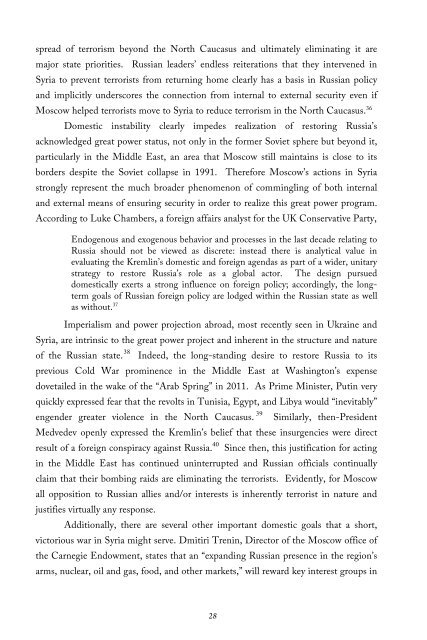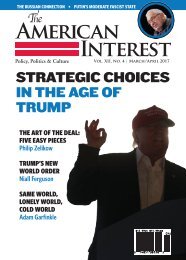You also want an ePaper? Increase the reach of your titles
YUMPU automatically turns print PDFs into web optimized ePapers that Google loves.
spread of terrorism beyond the North Caucasus and ultimately eliminating it are<br />
major state priorities. Russian leaders’ endless reiterations that they intervened in<br />
Syria to prevent terrorists from returning home clearly has a basis in Russian policy<br />
and implicitly underscores the connection from internal to external security even if<br />
Moscow helped terrorists move to Syria to reduce terrorism in the North Caucasus. 36<br />
Domestic instability clearly impedes realization of restoring Russia’s<br />
acknowledged great power status, not only in the former Soviet sphere but beyond it,<br />
particularly in the Middle East, an area that Moscow still maintains is close to its<br />
borders despite the Soviet collapse in 1991. Therefore Moscow’s actions in Syria<br />
strongly represent the much broader phenomenon of commingling of both internal<br />
and external means of ensuring security in order to realize this great power program.<br />
According to Luke Chambers, a foreign affairs analyst for the UK Conservative Party,<br />
Endogenous and exogenous behavior and processes in the last decade relating to<br />
Russia should not be viewed as discrete: instead there is analytical value in<br />
evaluating the Kremlin’s domestic and foreign agendas as part of a wider, unitary<br />
strategy to restore Russia’s role as a global actor. The design pursued<br />
domestically exerts a strong influence on foreign policy; accordingly, the longterm<br />
goals of Russian foreign policy are lodged within the Russian state as well<br />
as without. 37<br />
Imperialism and power projection abroad, most recently seen in Ukraine and<br />
Syria, are intrinsic to the great power project and inherent in the structure and nature<br />
of the Russian state. 38 Indeed, the long-standing desire to restore Russia to its<br />
previous Cold War prominence in the Middle East at Washington’s expense<br />
dovetailed in the wake of the “Arab Spring” in 2011. As Prime Minister, Putin very<br />
quickly expressed fear that the revolts in Tunisia, Egypt, and Libya would “inevitably”<br />
engender greater violence in the North Caucasus. 39 Similarly, then-President<br />
Medvedev openly expressed the Kremlin’s belief that these insurgencies were direct<br />
result of a foreign conspiracy against Russia. 40 Since then, this justification for acting<br />
in the Middle East has continued uninterrupted and Russian officials continually<br />
claim that their bombing raids are eliminating the terrorists. Evidently, for Moscow<br />
all opposition to Russian allies and/or interests is inherently terrorist in nature and<br />
justifies virtually any response.<br />
Additionally, there are several other important domestic goals that a short,<br />
victorious war in Syria might serve. Dmitiri Trenin, Director of the Moscow office of<br />
the Carnegie Endowment, states that an “expanding Russian presence in the region’s<br />
arms, nuclear, oil and gas, food, and other markets,” will reward key interest groups in<br />
28



